
Insights into the PR industry with PR Awareness Week
The week-long “PR Awareness Week 2021” was jointly organised by the Department of Public Relations of Faculty of Arts and Social Science (FAS) and the Institute of Public Relations Malaysia Student Association (IPRMSA) UTAR chapter from 2 to 6 August 2021 via Facebook live. The event, which saw participants enlightened on the developments in communications and public relations (PR), was organised in collaboration with Brand Soul Malaysia, Centriq PR, and Roots Public Relations.
Dr Lee highlighting the importance of being aware of the latest happenings in the industry in her speech
Kick-starting the virtual event with a welcome speech was FAS Dean Dr Lee Lai Meng, who said, “Every PR Awareness Day, the department will organise activities to create awareness among students and to provide knowledge and training to them, in order to improve their current skills. This year, I am pleased to see that the annual event has expanded to a week-long event that covers various areas in PR that will nurture students into quality graduates. While the University has always believed in maintaining excellence, the University also emphasises on the importance of developing good moral values, well-rounded soft skills and impeccable character building so that our students can leave the university as an intelligent and socially responsible member of society.”
Prof Ewe speaking on the need for PR to know their roles especially in challenging times
Present to officiate the opening ceremony was UTAR President Ir Prof Dr Ewe Hong Tat. “Despite the challenges posed by the current pandemic situation, UTAR is committed to ensuring the continuity of learning for all our students so that they are able to graduate with not just an academic degree but also with enhanced educational experience through the participation in various online extra-curricular activities. This will ensure that they remain engaged with learning from home, including interaction with other students across the world,” said Prof Ewe.
He added, “An event like the PR Week that encourages participation from various countries is truly meaningful especially in exchanging information and expertise that are crucial for students in preparing for the employment challenges ahead. The advice and expertise from the various speakers play a crucial role in preparing students and helping them to navigate through this difficult time and keep them updated with industry changes and demands. The role of public relations is even more demanding during such challenges and expert advice is what our students need.”
With the aim to provide participants a platform to share knowledge and exchange ideas on the PR industry, the virtual event organised a variety of activities, ranging from webinars to workshops and virtual mock interviews to prepare and equip participants in facing challenges of work and the current Covid-19 pandemic.
Prof Chang listing the essential skills required by a PR practitioner
Universiti Kebangsaan Malaysia (UKM) Assoc Prof Chang Peng Kee, who spoke on “Weapons to be equipped by PR Graduates in time of a pandemic” mentioned that the work force is likened to a battlefield, whereby graduates are competing with each other to secure an employment. On this note, Prof Chang emphasised the importance for students to possess essential soft skills, namely communication skills, social skills and teamwork. He also advised participants to be prepared in order to be able to adjust and adapt to the ever-changing environment. Whether at the university or work, Prof Chang advised participants to take advantage of all the training provided because it equips them with knowledge and skills that will make them a competent PR practitioner.
Dr Peter Denyer-Simmons explaining the effective use of social media as a listening tool
The keynote session by Assoc Prof Dr Peter Denyer-Simmons from the University of Newcastle, provided insightful information on the use of social media. His webinar was titled “Social Media as Listening Tools for Public Communicators”. Participants learnt, from the shark case study Dr Peter presented, the effective use of social media in managing sharks in New South Wales (NSW), Australia. The idea was to make waters safer for humans and minimise harm to marine life. Through the feedback provided by ocean users on social media, the government discovered three important trends, which were respect for marine life, hope for research and technology, and anger at the media, which eventually led to the implementation of the policy that banned the use of mesh nets and increased the use of drones. He emphasised that social media enables authorities to communicate better when they understand the community’s thinking. He also noted that qualitative analysis of social media is a useful tool to understand the public communicating policy because it is very accessible and up to date; enables them to hear reasons for attitudes and lived realities; gives voice to the voiceless and respects the way citizens communicate.
Dr Mohd Khairie listing some of the PR trends for 2021
Meanwhile, the second keynote session was presented by Dr Mohd Khairie bin Ahmad from Universiti Utara Malaysia (UUM). He spoke on “Tapping Post Covid-19 Competencies for Communication and Media Graduates”. He shed light on the PR trends and predictions for 2021, which were (1) an appetite for diversified information sources in addition to mainstream news; (2) an increased need for awareness in self-censorship as platforms become stronger arbiters; (3) demand in response to newly accustomed home-based way of living; (4) increased omnipresence for future-facing tech for everything, from supply chains to finance; and (5) increased need for shorter or more flexible contracts between client and PR agency. He also advised participants to equip themselves with competencies skills, including knowledge and skills in data science, creativity, problem-solving, and communication; be data-savvy and familiarise oneself with artificial intelligence.
Jacqueline showing an example of an email with errors
The “Netiquette – Digital Etiquette for Professionals” webinar by Managing Director of Centriq PR Jacqueline Arnold saw participants learning about digital manners when communicating with employers and clients. Using a case study of a candidate looking for employing via email, she advised participants to leave a good impression, whereby one can talk about the employer’s needs, describe one’s accomplishments, express one’s enthusiasm, provide clean error-free resume, and follow-up with the employer at the right time. She also advised participants to be careful when posting items on social media because most of the employers these days are taking steps to review Facebook and other media platforms of the job candidates. Employers are less likely to hire candidates whose social networking profile or tweets evidence unprofessional behaviour. FTC gave permission for Social Intelligence to run background checks on prospective employees’ internet and social media history. Although data is not stored, Social Intelligence has the ability to look up to seven years of an employee’s social media history,” said Jacqueline.
Participants were also advised to leave a good digital footprint, which Jacqueline defines as the record or trail of data left behind when users have been online. “Leaving a good digital footprint helps graduates when employers look into their background. Your digital footprint can be tracked, analysed, and used to construct a unique profile of you, including your location, social groups, behaviours and interests,” explained the speaker. She concluded by reminding participants to always interact respectfully and clearly with others in an online environment; use positive words to attract positive energy and results in life; practise proper and professional etiquette; be careful of the words uttered in the digital space because it can be used against the user in the court of public opinion; and lastly to be careful of things posted in the digital space because social media never forgets.
Karla sharing the results of her research on the Philippine’s perspective towards the Covid-19 pandemic
At the “Responding to the Pandemic: A Philippine Perspective” webinar by Communicator Instructor from Mariano Marcos State University, Karla Auria Galeon, participants learnt that the health literacy in the Philippines was low, especially in view of the current pandemic. She shared from her research on the use of e-health literacy to educate the citizens on the importance of health. Her research found that although the exposure to the Covid-19 information on social media was high, the adherence to health protocols were low. In a role of the communicator, Karla advised participants that PR practitioners must give factual information in the fastest time possible, but not at the expense of the inaccuracy of information. She also explained that, in view of the increased usage of social media for communication and interaction, there is a need for media literacy.
Wong explaining the importance of brand strategy
Further enlightening the participants was the “Brand2Win: Is Getting a Brand on Tik Tok Worth It?” webinar, presented by Brand Soul Malaysia, in two parts. The first part saw Director-cum-Brand and Marketing Strategist Stella Wong elucidating on branding and strategy. “A brand is a logo, a purpose and a summary of what other people think of you and your company from the products and services you provide. Therefore, it is important to have a strong brand foundation because it is a formula and key differentiator that sets your business apart from your competitors; it strengthens your brand image and personality and it enables you to find a solution for interacting with your customers that will interest them towards your brand,” explained Wong. She then further explained the use of brand strategy and its importance.
Loh explaining the effectiveness of TikTok in promoting a brand
The highlight of the webinar was the second part, where Senior Brand and Marketing Executive Jane Loh shared the application of Tik Tok for successful branding. It was noted that TikTok videos are hyper-relevant and more engaging because of its powerful combination of relevance and engagement, which create a more pleasurable experience. Participants also learnt that TikTok enables users to be more receptive to brand messaging and call-to-action from businesses of all sizes.
Loh explained on whether the use of TikTok is relevant for a business, “A top trending song in TikTok is typically a top trending song in Spotify, which illustrates the true influence of the platform. Content creators reap a higher engagement rate in TikTok compared to Instagram and YouTube. Among the users, 65 billion population is above 20 years old and the majority of the audiences remain below 30 years old. So to make TikTok successful for your business, you need to understand its algorithm. TikTok’s algorithm is based on users’ interests and it constantly tests new content. It continually searches for new songs, which allows people to build an audience and gain fame easier. TikTok rewards users for keeping the audience on the app as well.” She then shared some tips for making a TikToK video viral, which included keeping the video in optimal length, creating high-quality content, embracing entertainment, starting with right sound, being authentic, and posting often.
Other activities include workshops that benefitted the participants by further honing their skills. The “Email Writing” workshop conducted by UTAR academic Geetha Veerappan saw participants learning the proper way to write emails and the different styles of writing emails. The workshop by UTAR academic Sarvarubini Nainee on “APA Referencing and Citation” educated participants on the mechanics of academic citation and referencing using the latest APA format. The “Basic Microsoft Word and Microsoft Excel” Workshop conducted by UTAR academic Tan Soon Aun enabled participants to learn the basic skills needed to use the programmes. The “Finding Connection between Studying and Learning” workshop by Mandarin Interpreter from Language Line Solutions Kok Heng Foong helped participants to practise better study habits.
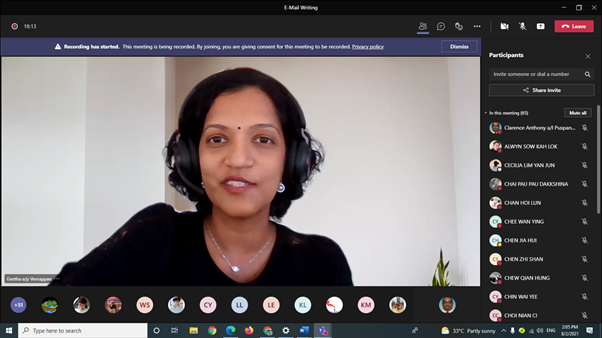
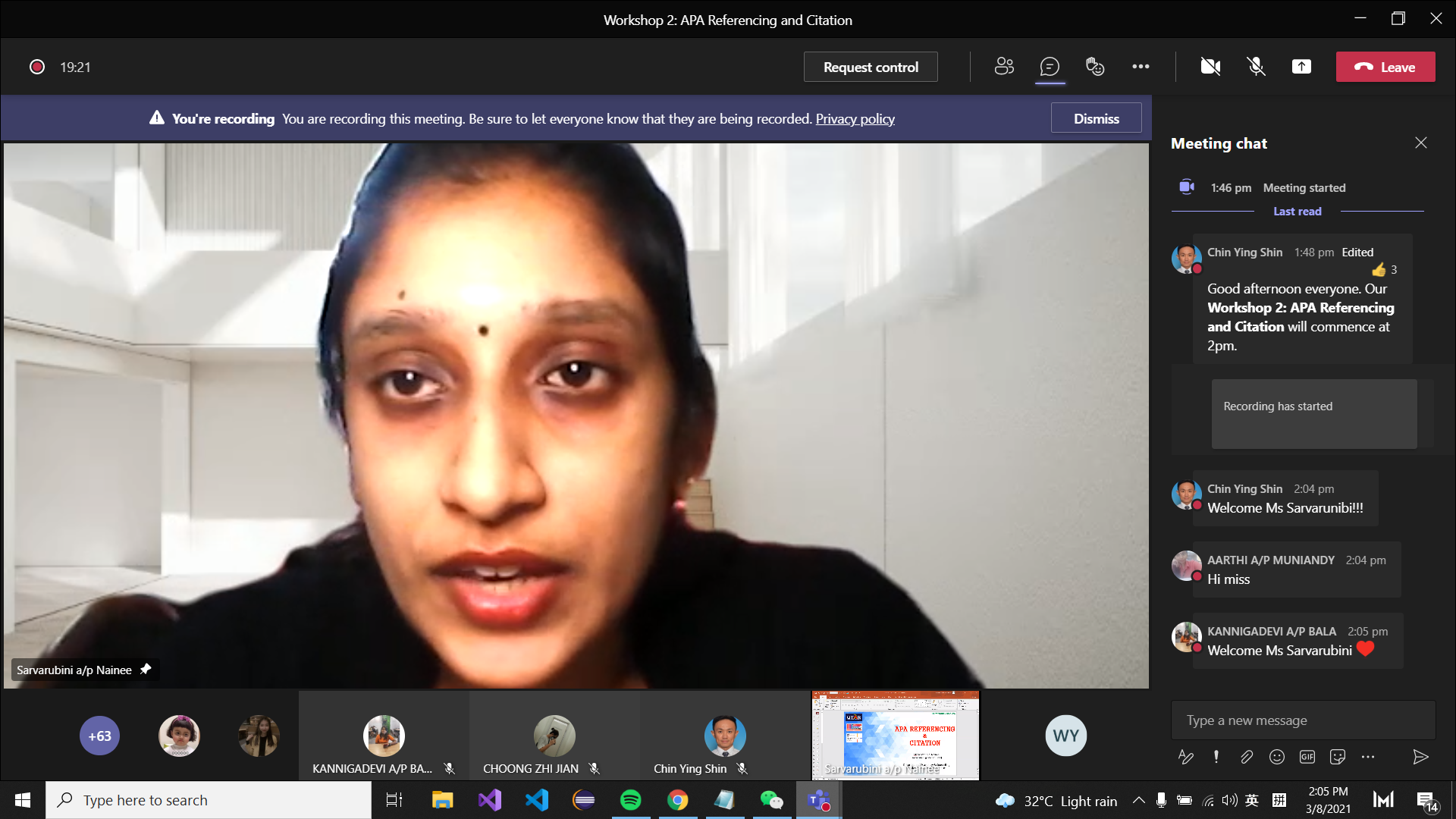
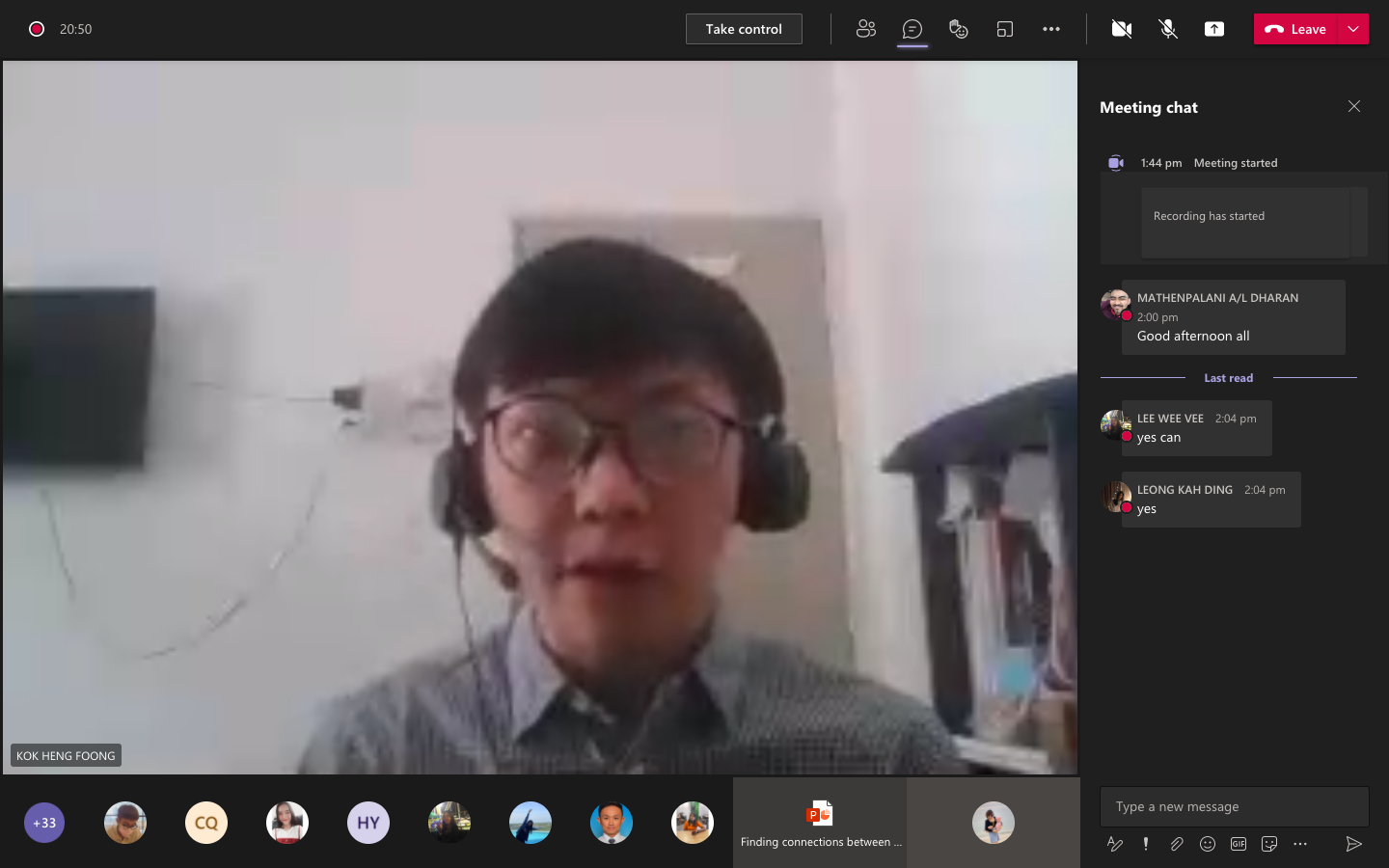
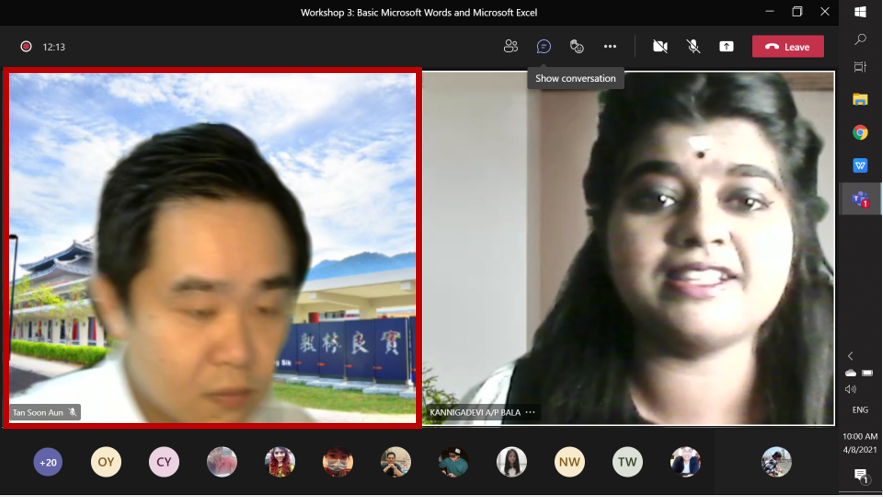
Workshop conducters, clockwise from top left: Geetha, Sarvarubini, Tan (in the red box) and Kok
Leaning towards preparing participants for their future work and career, the “What it takes to Land a Job?” workshop by Talent Management Executive of Roots PR Cayden Diow taught participants on applying the right strategies and techniques for job application; basics of job application process and ways to conduct oneself during job interviews in order to increase their employment chances. Meanwhile, the workshop by UTAR academic Dr S. Charles Ramendran taught participants on creating a resume that is able to attract the attention of potential employers.
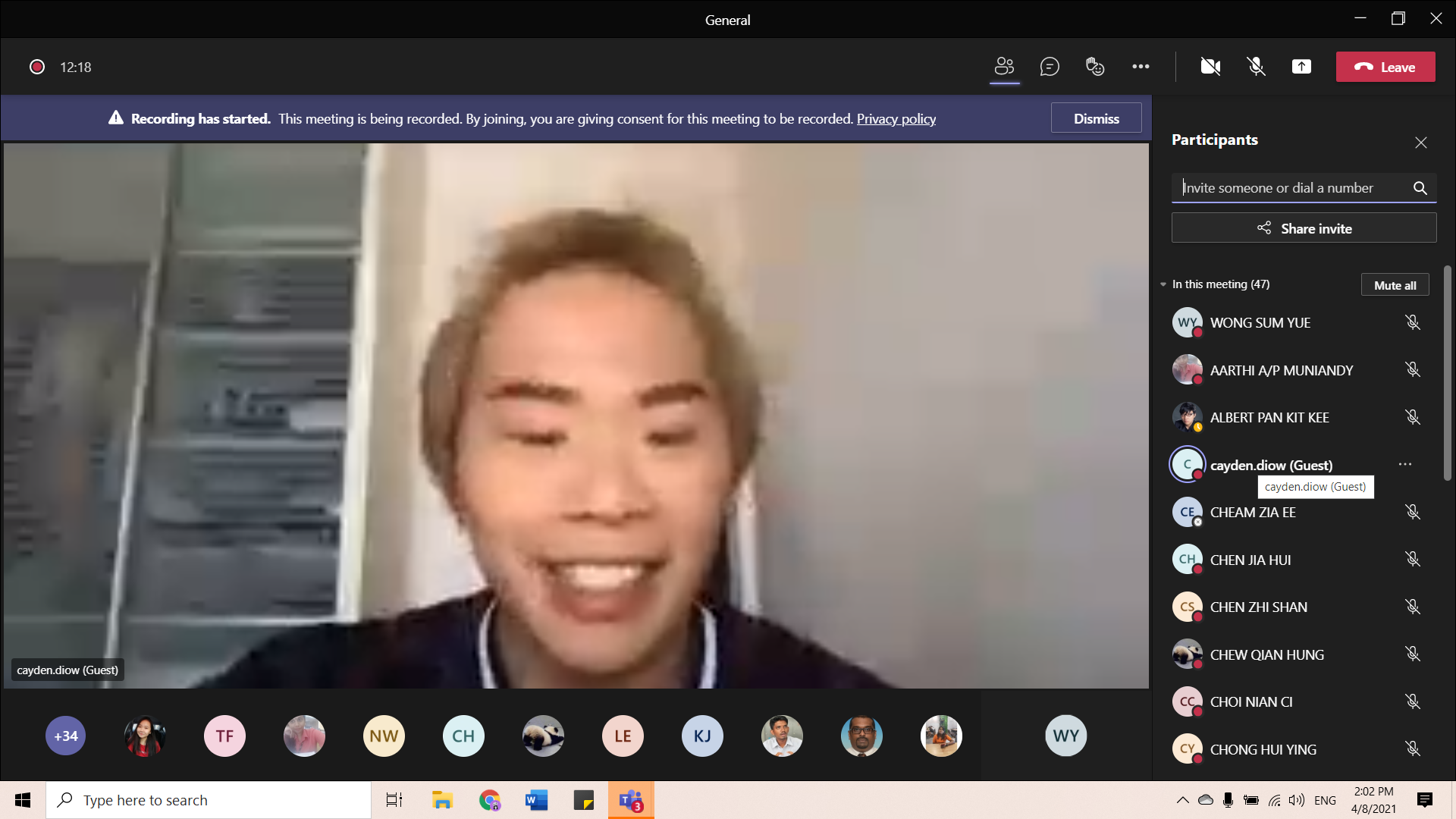
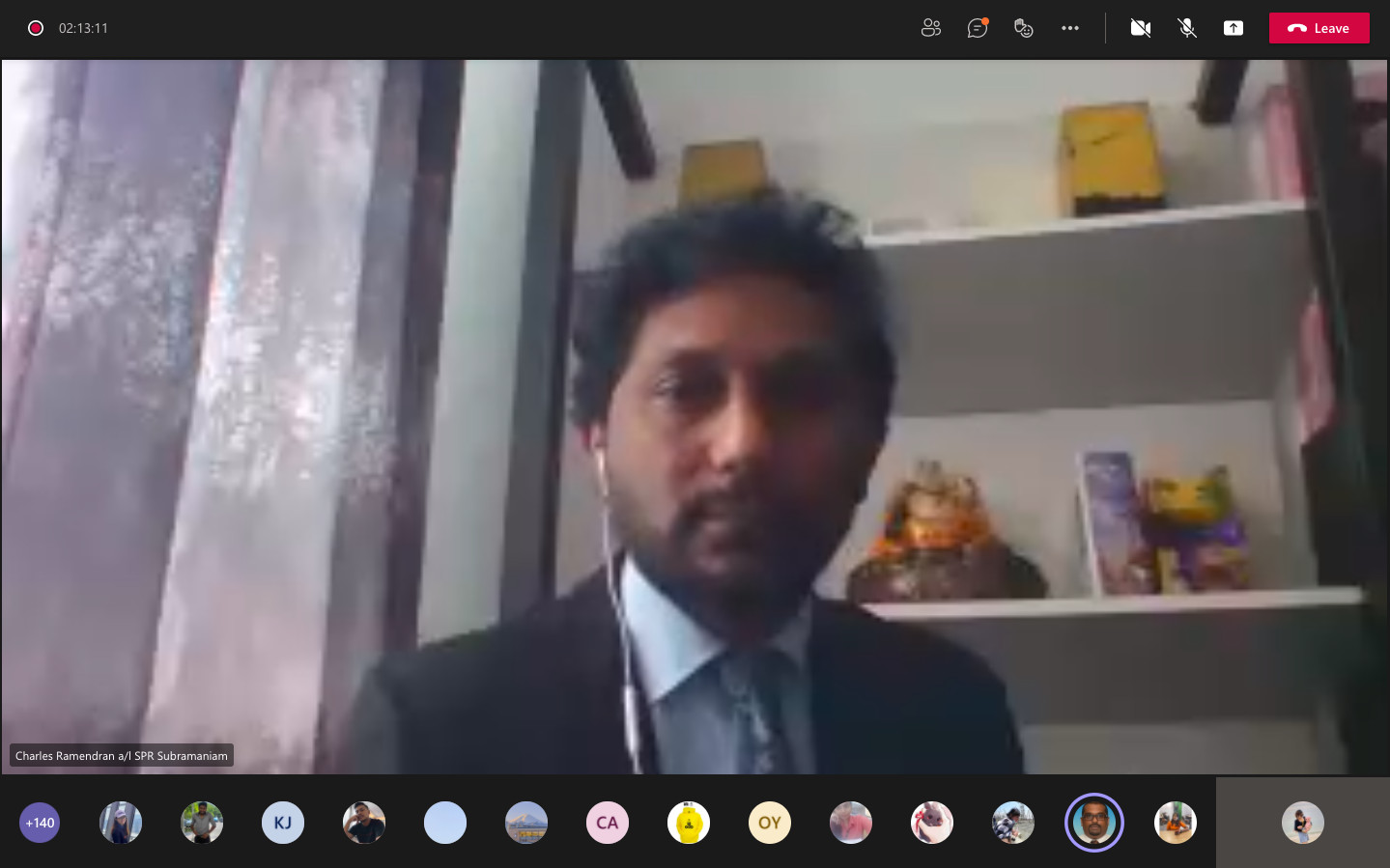
Diow (left) and Dr Charles advising participants on ways to secure an employment
© 2021 UNIVERSITI TUNKU ABDUL RAHMAN DU012(A).
Wholly owned by UTAR Education Foundation (200201010564(578227-M)) LEGAL STATEMENT TERM OF USAGE PRIVACY NOTICE